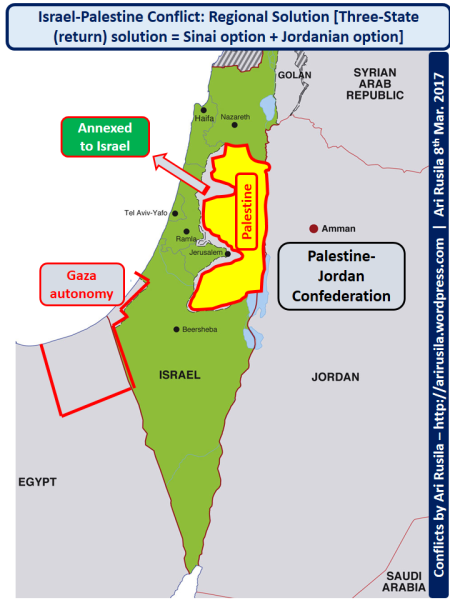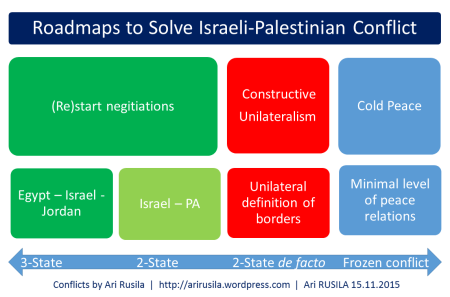 Ever since Israeli Prime Minister Benjamin Netanyahu had his meeting with US President Donald Trump in Washington on 15th Feb. 2017, Israeli efforts have intensified to develop alternatives to the single-state or two-state solutions. Also the Palestinian leadership is currently holding intense deliberations – both internally as well with its Arab allies, such as Egypt, Jordan and Saudi Arabia – about the regional approach.
Ever since Israeli Prime Minister Benjamin Netanyahu had his meeting with US President Donald Trump in Washington on 15th Feb. 2017, Israeli efforts have intensified to develop alternatives to the single-state or two-state solutions. Also the Palestinian leadership is currently holding intense deliberations – both internally as well with its Arab allies, such as Egypt, Jordan and Saudi Arabia – about the regional approach.
Israel and Palestinian Authority have negotiated two decades about solution based on Two-States, and now maybe more than ever one can claim that the roadmap towards it is the dead end. Instead the situation today is drifting towards One-State option, which is unwanted outcome for both parties. New and “out of the box” ideas are needed.
According Al-Monitor there are currently three main ways to square the circle and bypass the quagmire of negotiations between Israel and the Palestinians.
- A “regional peace process” instead of bilateral Israeli-Palestinian negotiations.
- The confederation with Jordan idea, newly resuscitated.
- Trilateral land swaps involving Israel, Egypt and Palestine or even a four-way exchange including Jordan.
Regional approach
According Al-Monitor what stood out in US President Donald Trump’s statement at the joint press conference with Israeli Prime Minister Benjamin Netanyahu on Feb. 15 was the regional approach to Israeli-Palestinian peacemaking – prior to the Trump-Netanyahu meeting, the administration discussed with Egypt, Saudi Arabia and Jordan a regional umbrella to Israeli-Palestinian peace negotiations.
The Palestinian leadership is currently holding intense deliberations, both internally and also with its Arab allies, primarily Egypt, Jordan and Saudi Arabia. According to a senior Fatah security official, Ramallah, in conjunction with its Arab partners, decided to take Trump at his word about the regional approach. Together with Egypt it will suggest to Washington an outline of a new regional approach.
This new outline will be based on three principles. The first principle is that the basis for future peace negotiations is the Arab Peace Initiative of 2002. Then, on this basis, the second principle is the US administration should hold in the coming months a summit in Washington with the Arab leadership. This summit should focus on preparing a regional peace conference leading to Israel-Palestinian negotiations based on the Arab Peace Initiative, with the participation of Egypt, Jordan, Saudi Arabia and Morocco, chaired by Trump. The third principle concerns advancing the Palestinian statehood issue through an attempt to reach a Palestinian-Jordanian confederation agreement backed by the Arab League. (Source and more in Al-Monitor )
Regional approach does not need – necessary – to be based on Arab Peace Initiative of 2002. From my point of view “regional peace process” can be implemented by Egypt, Jordan and Israel and instead of Arab Paece Initiative be based on Sinai and Jordan options.

Jordanian Option sinks into oblivion
Unlike any other Arab country, Jordan has a special connection to the Palestinian issue. The West Bank was part of the Hashemite kingdom when it was occupied by Israel in 1967. And since the first Arab-Israeli war in 1948, Jordan has been on the receiving end of successive waves of Palestinian refugees from Israel proper, the West Bank, and Gaza Strip.
The proposal that the West Bank could be divided between Jordan and Israel, or that Jordan could take responsibility for the Palestinian population in the West Bank, goes as far back as the Allon Plan of 1967. The “Jordan is Palestine” idea suggests that a Palestinian state already exists on the East Bank of the Jordan River, where at least 50 percent of the population is of Palestinian origin.
It’s been decades since the issue of confederation between the Kingdom of Jordan and Palestine was a matter of public debate. The idea gained traction in the mid-1980s and early 1990s as the rift between Jordan and the Palestine Liberation Organization narrowed and King Hussein and Yasser Arafat appeared to reconcile their differences. In principle, the two leaders agreed that once the state of Palestine is born, it will choose to join Jordan in a confederation between two sovereign states.
But the Oslo process, leading to direct secret negotiations between the PLO and Israel that resulted in the signing of a “declaration of principles” on the White House lawn in 1993, put the idea on hold. Jordan went on to sign its own peace deal with Israel in 1994, and the Palestinians were caught in endless and often fruitless negotiations with Israel under US auspices. That process took a nosedive following the second Palestinian intifada in 2000 and the death of Arafat in 2004.
Under King Abdullah and Palestinian leader Mahmoud Abbas, the subject of confederation rarely if ever surfaced publicly. Jordan supported the two-state solution and underlined its historical custodianship of Muslim and Christian holy places in Jerusalem, a subject that often marred relations between Abdullah and Abbas. (Source: Al-Monitor )
Reincarnation of Jordanian Option
Some five years ago I wrote an article Palestinians Put Jordanian Option on the Table . There I described how Farouk Kaddoumi, a veteran PLO official, dropped a political bomb on 31st Oct. 2012 with a call for “returning” the West Bank to Jordan during an interview with the London-based Al- Quds Al-Arabi newspaper. Kaddoumi, who is based in Tunisia, said he supported the idea of a federation or confederation between the West Bank and Jordan. His remarks were the first of their kind to be voiced by a senior PLO figure in decades. Kaddoumi is one of the founders of Fatah, and for decades served as head of the PLO’s “political department.”
Recently – 22nd May 2016 – former Jordanian Prime Minister Abdelsalam al-Majali, who negotiated the peace deal with Israel in the 1990s, announced that he personally believes that confederation between an independent Palestine and Jordan is the best option for both people.
He was quoted by a Palestinian news agency as declaring before 100 Nablus notables that Israeli Prime Minister Benjamin Netanyahu had repeatedly called on Jordan to adopt the confederation option with the Palestinians immediately, and that Jordan had rejected the idea. For Majali, confederation means “a joint legislature and a joint government with equal representation whereby the upper authority will have three main missions — se curity, economy and foreign affairs — and the rest will be the jurisdiction of the joint government.” He also said, “In a confederation, centralization will have to end and the people will have the ultimate choice of how to govern themselves.” (Source: Al-Monitor )
More recently – 20th Feb. 2017 – Israel’s Education Minister, Naftali Bennett, and head of the far-right Jewish Home party, has been referring to the existence of two Palestinian states; one in Gaza and the other in Jordan.
According The Middle East Institute Trump has yet to unveil a detailed vision for peace between Israel and the Palestinians, if any. There is a feeling in Amman that although the U.S. president talked about concluding a “bigger and better deal,” in reality neither he nor Netanyahu can come up with a better alternative to the two-state solution. Nevertheless, while the two-state solution may have been an ideal one, many analysts have conceded that it is dead and buried. Meanwhile, Jordan can do nothing other than pretend that it is still alive: the alternatives represent an existential nightmare for the kingdom. (Source: The Middle East Institute)
Sinai Option

At its core, the Sinai Option proposes expanding the Gaza Strip to five times its current size and settling all the Palestinian refugees in a state to be established there. Under the initiative, this state will be demilitarized, Army Radio reported. In addition, the report continued, the Palestinian Authority would be granted autonomy in the Palestinian cities in the West Bank in exchange for relinquishing the Palestinian demand to return to 1967 borders.
My conclusion
The geographic juxtaposition between Israel and Jordan should make delineating the border between the two countries in an agreement considerably easier than reaching a deal on a border between Israel and a planned Palestinian. If Jordanian option will be implemented so Israel would receive security guarantees from Jordan’s monarchy, which made peace with Israel in 1994, rather than from a politically enfeebled Palestinian president; if also Sinai option will come reality so security guarantees will be from Egypt, which has peace deal with Israel since 1978, rather than from outside supervised Hamas. Indeed – if both Jordanian and Sinai options were realized the outcome would be Three State (return) Option , which I have been advocating earlier as the most pragmatic solution to Israeli-Palestinian conflict.
Personally it is very refreshing that Jordanian option again is moving on. For decades regional leaders, international community UN etc have sung the praises of Two-State solution as the only option so my views have represented some kind of dissidence. While some prominent politicians now have came to the same conclusion I think that the reasons might be the same as mine: there is some sense with Three-state option, it is both pragmatic and achievable solution to Israeli-Palestinian conflict. Now it is also more acceptable than few years ago.
My conclusion is that now is the right moment to explore the regional alternative based on Jordanian and Sinai options. If there is no progress during coming months then the best way forwards from my perspective is Israeli unilateral actions hopefully based on “Constructive Unilateralism” approach (more in Constructive Unilateralism (II) as Solution to Israeli-Palestinian Conflict).

Related article: Analysis: Resolving The Israeli-Palestinian Conflict
Advertisements
